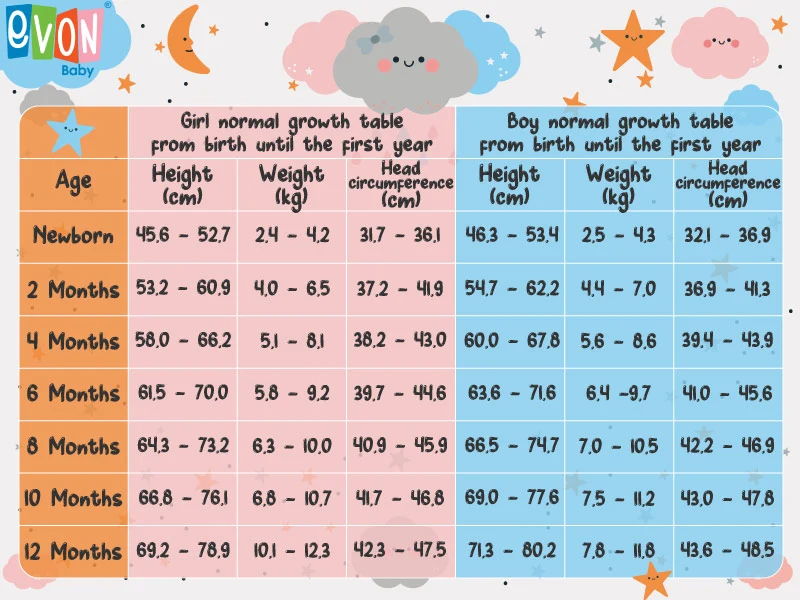Average Baby Weight and Height in the First Year

Average Baby Weight and Height in the First Year
Every mother wants her little one to grow in good health and achieve normal rates of development, but most of the time she does not know the average percentage of her child’s weight and height every month since birth, especially since the matter varies from one child to another, which makes her worry about whether he is growing at a rate Normal or not, so after I accompanied you
EVON BABY Throughout pregnancy, in this article, you provide a comprehensive guide on the average weight and height of children in the first year, and how you can succeed in feeding your child in a healthy way, to grow and develop at a normal rate.
Table of average weight and height of children in the first year In the first year, the growth rate of males does not differ much from females, but depends primarily on genetic factors, the child may be tall, because his parents are tall and vice versa, and in general the length of the child is in the first year 60 centimeters and weighs 8 kilograms, and by the end of the second year it reaches 86 centimeters, and it weighs approximately 12 kilograms, with slight differences between females and males that we will explain to you below, through a table of the normal weight and length of the child from birth until the first year:
The average weight of the child at birth
The weight of the child at birth generally depends on the nutrition of the pregnant woman during pregnancy, and during the last three months in particular, in addition to the genetic factor as well. If the mother suffers from obesity or if she suffers from diabetes or even gestational diabetes, the weight of the newborn will be greater It is normal, and he may be exposed to obesity and weight gain in his later life, while the baby’s weight is less than normal, if he is a premature baby, i.e. born in the seventh or eighth month, or if the mother’s pregnancy does not exceed 37 weeks, in general, but he may be born with a weight Less than normal if the mother's pregnancy continues for a long time, or she has been exposed to an infection, or if she is pregnant with twins. On average, a child weighs at birth in normal conditions between 2.5 kilograms and 4 kilograms.
Normal baby growth after birth
The baby weight and length must be monitored regularly, to ensure its growth according to normal rates - especially in the first year – and it can be weighed once every two weeks in the first two months of its life, and then once a month thereafter. Usually, the child’s weight and height increase at the following rates:
- Weight: The child weighs between 2.5 and 4 kilograms at birth. After that, the child who is breast-fed increases his weight at a rate of 196 grams per week in the first three months of his life, and increases his weight at a rate of 148 grams in the following three months. then at a rate of 113 grams in the following three months, and increases by 71 grams per week in the last three months of the first year, and in the second year the child’s weight increases at a rate of 42 grams per week. Males are usually heavier due to muscle mass, and other factors affect the weight of the child, such as genetics and the weight of the parents - especially the mother - as long as the breast-feeding is, however, the child's weight may be average or above average, while the mother is below average due to genetic factor.
- Height: Height depends largely on the genetic factor. On average, the length of children increases at a rate of 1.5 to 2.5 centimeters every month from birth to six months, and at a rate of one centimeter from the age of six months until they reach the age of one year, and in general, the length of children at the end of the second year of their life is about 80 centimeters. There are several things that should be paid attention to more than the child’s weight and height, including his general condition, activity, vitality, immunity, motor development and others, although weight and height remain important factors for measuring the growth rate.
Baby feeding tips
Feeding a baby affects his growth and weight greatly, and breastfeeding - whether natural or formula milk - is the main source of nutrition for infants during the first six months of their life, after which you can start introducing solid foods, and to ensure the healthy growth of your little one, follow these tips:
- Breastfeeding: Breast milk or artificial types are the main source of nutrition, and infants during the first six months after birth do not need any other source of nutrition, such as juices, water, ready-made cereal powder, etc., only breastfeeding.
- Feed your newborn baby regularly: It is preferable to organize breastfeeding for your baby at a rate of every two hours, as most newborns need 8 to 12 feedings per day, at a rate of one feeding every two to three hours.
- Watch for signs of hunger: look for early signs of baby hunger, such as moving his hands to his mouth, sucking his fingers or lips, and don't delay it until your baby cries, the sooner you start breastfeeding, he will calm down quickly, cry less throughout the day, and fall asleep deeper at night. When your baby stops feeding, closes his mouth, or pulls away from the nipple or bottle, this is a sign of fullness, or he may simply be resting a bit and will finish feeding again, so burp your baby, or wait a minute before offering the breast or bottle. once again.
- Offer him nutritional supplements: Consult a doctor about providing vitamin D supplements to your child, especially if you are breastfeeding. Breast milk may not provide enough vitamin D, so supplementation is essential to help your baby absorb calcium, phosphorous, and nutrients that are essential for bone health.
- Expect a difference in your newborn's eating pattern: Your newborn won't feed the same amount every day. In growth spurts (starting within two to three weeks after birth) he may need more milk at each feeding, or may want to feed him more often.
- Choose healthy solid foods: Many mothers make a mistake when starting to introduce solid foods, by reducing breastfeeding and relying on food. You should also choose the types of foods, and start with pureed vegetables, such as carrots, zucchini and potatoes, and try each type separately for three days first, before moving to another type, provided that you provide small amounts at first (two teaspoons), and choose healthy foods such as fruits, vegetables, rice puree and others.
Finally, my dear; After you know the table of average weight and height of children in the first year, trust your instinct as a mother. And that his weight does not increase, and he gets less than six diapers a day, so consult a pediatrician to find out the reason behind this. To read more articles on infant health and development and tips for proper feeding, visit the Infant Nutrition and Health section of the Evon Baby website.
One thought on “Average Baby Weight and Height in the First Year”
Leave a Reply Cancel reply
You must be logged in to post a comment.


спасибо за инфу